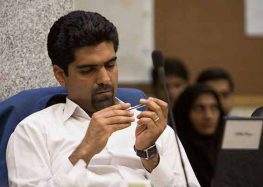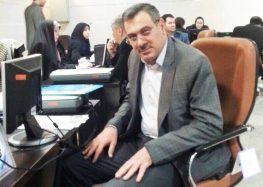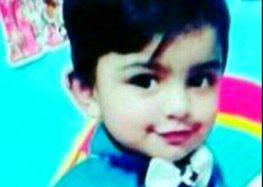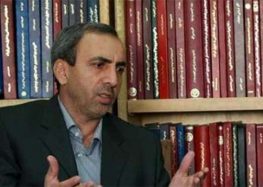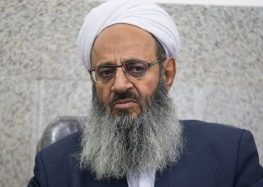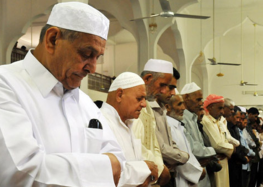Sunni Council in Iran Suspends Operations Amid Ongoing Arrests and Intimidation
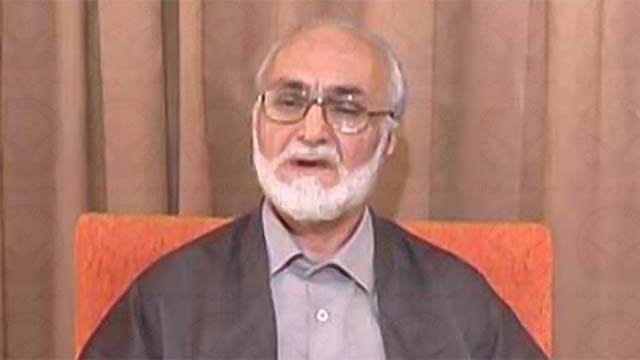
Dissident Sunni cleric Hassan Amini is the secretary general of the Sunni Theologians Council of Iran.
The Council of Sunni Theologians of Iran (CSTI), representing clerics based in the country’s northwestern Kurdish-populated provinces, suspended operations on July 13, 2017 in response to the ongoing climate of intimidation and fear perpetuated by the Intelligence Ministry, the group’s leader told the Center for Human Rights in Iran (CHRI).
“After the incident in Tehran and the attack on Parliament [on June 7, 2017], unfortunately some of the attackers were said to be Sunni activist members of Daesh,” CSTI’s secretary general, dissident cleric Hassan Amini, told CHRI. “That’s when the pressure piled on.”
Daesh is the Arabic word used by Iranians to refer to the terrorist group that calls itself the Islamic State, also known as ISIS, IS and ISIL.
“However, the fact is that we do not support the attackers,” said Amini. “The Sunni community does not agree with them. Yet a number of Sunni seminary students and theologians have been summoned and detained in Kurdistan, Kermanshah and West Azerbaijan provinces.”
“Even though we are a peaceful group, we thought it would be better to suspend our activities until things settle down,” he added.
After the terrorist attack in Tehran by ISIS that left 17 people dead and 43 injured, dozens of people were arrested around the country by security forces for having alleged ties with ISIS and other Sunni radical groups.
However, state intimidation tactics against CSTI began long before ISIS’ first terrorist attack on Iranian soil, Amini told CHRI.
After the group’s fourth and last conference at the al-Nabi Mosque in Sanandaj, the capital of Iran’s Kurdistan Province, on October 4, 2016, nearly half of the more than 400 Sunni theologian participants were summoned and threatened by the Intelligence Ministry, Amini told CHRI.
He added: “They were told [by Intelligence Ministry officials] that the conference was illegal because it was held without a permit. But we don’t need a permit for our religious activities because we are within constitutional boundaries.”
Article 12 of Iran’s Constitution species the rights afforded to the officially recognized Sunni branches of Islam, a minority in Shia-dominated Iran: “…Other Islamic schools, including the Hanafi, Shafi’i, Maliki, Hanbali, and Zaydi are to be accorded full respect, and their followers are free to act in accordance with their own jurisprudence in performing their religious rites. These schools enjoy official status in matters pertaining to religious education, affairs of personal status (marriage, divorce, inheritance, and wills) and related litigation in courts of law.”
According to Article 26: “The formation of parties, societies, political or professional associations, as well as religious societies, whether Islamic or pertaining to one of the recognized religious minorities, is permitted provided they do not violate the principles of independence, freedom, national unity, the criteria of Islam, or the basis of the Islamic republic. No one may be prevented from participating in the aforementioned groups, or be compelled to participate in them.”
Amini told CHRI the council has a right to conduct its peaceful operations.
“We believe it is our right to conduct peaceful activities,” he said. “All we wanted to do was show national solidarity and present peoples’ solutions to new problems, but the authorities haven’t even tolerated something as simple as that.”
CSTI announced the suspension of its activities in a statement published on July 13, 2017.
“Given the political conditions in the region and the obstacles put in the way of our activities, the council’s board has unanimously decided to suspend all activities until further notice,” said the statement.
Amini, who is also the director of the Imam Bokhara seminary school for Sunni theologians in Sanandaj and a Sharia judge for the community, said CSTI is taking precautionary measures.
“The security climate over Sunnis in Kurdistan is such that we had to suspend the council’s activities,” Amini told CHRI. “We have not disbanded, but we thought it would be prudent to postpone our meetings and activities for a while in order to avoid any problems for Sunni scholars.”
Amini was tried in the Special Court for the Clergy in Hamadan, 200 miles west of Tehran, on June 29, 2017 on charges of “propaganda against the state,” but he is still awaiting the verdict.
“I told the court that the state is one thing and the governing establishment is something else,” the Sunni theologian told CHRI. “I have said nothing against the Islamic Republic or the Constitution. But I have spoken about actions taken by the officials. Officials are not the same as the state.”
“I said I have addressed officials about certain rights that have so far been denied to Sunnis and other minorities,” he added. “I think my reply to the accusations against me was sufficient and to some extent the judge accepted my argument, but he has not issued a ruling yet.”
Amini was interrogated by agents of the Intelligence Ministry in Sanandaj on August 6 and 7, 2016 after criticizing the execution of more than 20 Sunni prisoners in Rajaee Shahr Prison in the city of Karaj, west of Tehran.
In a statement published on August 3, 2016, a day after the executions, Amini expressed sympathy for the families and said the victims “had been denied the most basic religious and legal rights to have a lawyer and defend themselves in an open trial.”
“What is shocking is that the relevant authorities have shown a complete lack of regard for sectarian and religious fires currently burning throughout the Middle East,” he said. “Instead of spreading love, kindness and true solidarity among Shias and Sunnis, the execution of these youth has poured more fuel onto sectarian fires and helped the enemies of religion.”

